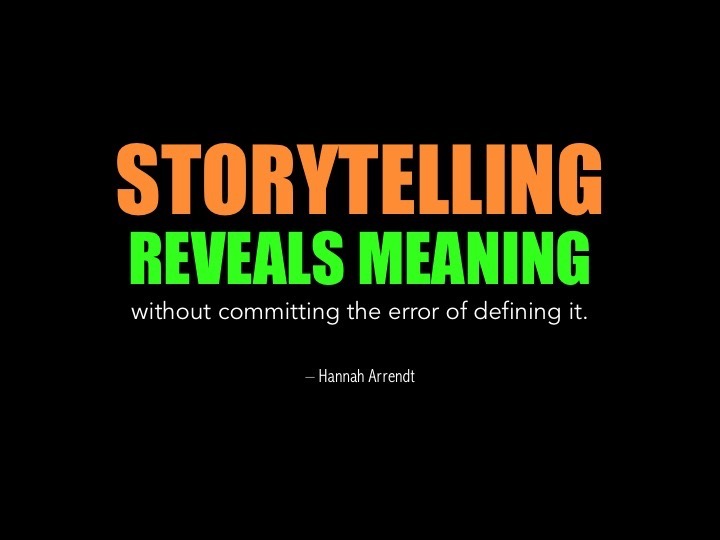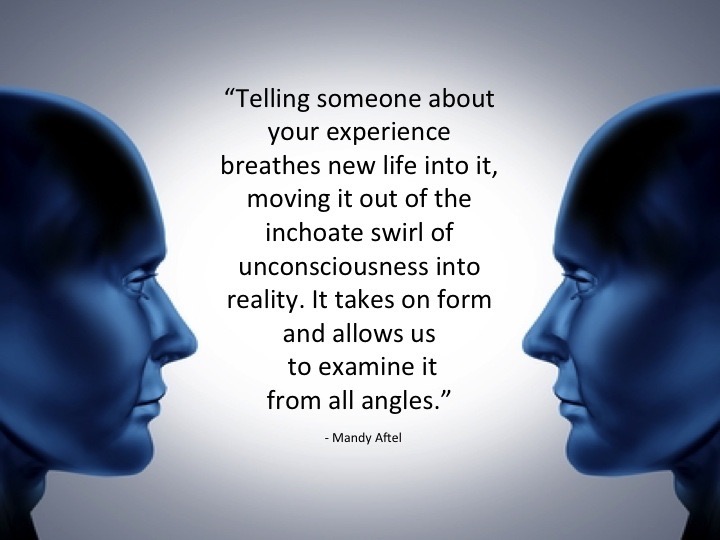The Art of Unpacking Stories

Stories are gifts. When received, they animate, uplift, reveal, and inspire. Like any gift, however, stories need to be opened, not just received. Being given a gift is one thing. Fully enjoying the gift you've been given is something else -- and that requires removing the gift wrapping to see what's inside.
How do you remove the wrapping from a gift you've been given? How do you unpack the stories that are shared with you in order to discover what's contained within -- what most people refer to as the "moral" or the "message"?
There are many ways to do this. There is no one, "right" way.
Ultimately, it all depends on the setting, the timing, your interest, and how much permission the storyteller has granted you, as story listener. Nevertheless, there are some time-tested principles you may want to consider before responding to the stories you are told:

1. Pause and reflect
2. Trust your first response
3. Get curious
4. Ask questions
5. Double click
6. Relate the story to your own life
7. Go beyond the urge to analyze and advise
A DEEPER DIVE INTO UNPACKING TECHNIQUES
1. Pause and Reflect: When somebody gives you a gift, your first response does not, necessarily, require words. It's perfectly fine to savor the feeling of having been given the gift. The same principle applies to the moment of just having listened to a story. Nowhere is it written that you must rush to respond. It's perfectly OK just to let the story in and feel it in your bones. While your mind may want to respond immediately, something else inside you is content to savor the moment and how the story makes you feel.
2. Trust Your First Response: As the Zen Masters like to say, "first thought, best thought." The same holds true for story listening. Your first thought or reaction to a story usually has a lot of mojo associated with it. It's a clue, a catalyst, and an indication that a connection has been made. Indeed, the first response that comes up for you upon listening to a story will likely be a very meaningful one -- and possibly, time allowing, worth sharing with the storyteller. Your choice.
3. Get Curious: After listening to a story, see if you can tune into what it is that fascinates you about it -- what piques your interest, what grabs your attention, what you find especially memorable about it. This rising curiosity will often inform what you choose to express to the storyteller and how you express it. Curiosity may have killed the cat, but it won't kill you or the storyteller. Quite the opposite. It will open up a rich vein of exploration.

4. Ask Questions: Take a cue from the Greek philosopher, Socrates -- he of the "Know Thyself" school of life. His approach to communication (i.e. the Socratic Method) has stood the test of time and is a powerful way to spark meaningful dialogue via the asking of provocative questions. If the story you have heard sparks a question in you, consider posing that question to the storyteller. Your asking not only builds rapport with the storyteller, it has the potential to spark a very nuanced response -- for both of you.
5. Double Click: If you have ever used a computer, you already understand the concept of "double clicking" -- the act of tapping on a folder or link to further explore your need for more information or knowledge. Similarly, you can double click after listening to a story. How? By requesting the storyteller to elaborate on a particular theme, character, image, obstacle, or plot point. Sometimes there is more to the story than the storyteller has let on. Double clicking is a gift you give the storyteller -- a way to further explore the meaning of what has just been shared with you.
6. Relate the Story to Your Own Life: Often, the stories we hear trigger memories, feelings, and past experiences from our own lives. The story we hear, in effect, becomes an alchemical catalyst to help us get in touch with aspects of ourselves that are begging for attention. Letting the storyteller know how their story affects you is a wonderful way to unpack the buried treasure of their story and, by so doing, facilitates a rich dialogue about what it means to be a self-aware, resilient, and open-minded human being.
7. Go Beyond the Urge to Analyze and Advise: It is not uncommon for people to ask an artist what their work of art "means". It is also not uncommon for the artist not to respond -- wanting their work of art to stand on its own, knowing, as they do, that "art appreciation" is a subjective experience and that overly explaining their creative expression can often leach the life right out of it.
It's the same with storytelling. Indeed, unpacking a story, for some people, feels wrong. They believe that a story, like any work of art, should stand on its own. And while there is something to be said for this approach, there is also something to be said for the process of unpacking a story -- as long as it's done with heart, skill, sensitivity, and presence. And please remember this: unpacking a story does not give you permission to analyze, therapize, advise, or "fix" the storyteller -- especially if the story told reveals some of their vulnerabilities, imperfections, or questionable choices. Your role, as a story listener, is simply to be fully present. The telling of the story, itself, and the non-judgmental dialog that follows will often be enough to facilitate whatever "healing" needs to happen.

STORY UNPACKING SOUNDBYTES:
-- "I'd love to hear more about 'X'. Can you elaborate?"
-- "The image of 'Y' fascinated me. Can you say more about that?"
-- "If you were going to give your story a title, what would it be?"
-- "I can totally relate. Something like this once happened to me."
-- "Are there any parts of the story you chose to omit?"
-- "What do you think the message or moral of your story is?"
-- "How did the experience you referred to impact your life?"
-- "What fairy tale or myth does your story remind you of?"
-- "What did you learn about yourself or life from this experience?"
-- "What advice does the hero of your story have for the rest of us?"
-- "If there was buried wisdom in your story, what would it be?"
Storytelling for the Revolution
Storytelling at Work
The Wisdom Circle Facilitation Training
MitchDitkoff.com
Posted by Mitch Ditkoff at February 6, 2020 09:51 AM
Post a comment
Thanks for signing in, . Now you can comment. (sign out)
(If you haven't left a comment here before, you may need to be approved by the site owner before your comment will appear. Until then, it won't appear on the entry. Thanks for waiting.)







 If you like this blog, you might also like Mitch's other two blogs:
If you like this blog, you might also like Mitch's other two blogs: 